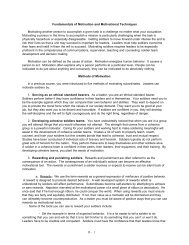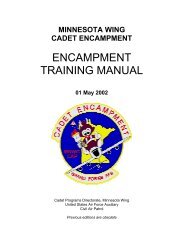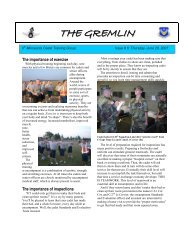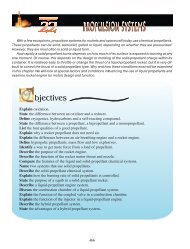16.3 Negotiating Effectively Across Cultures:Bringing Out the DEADBy John W. Miller, Ph.D.OBJECTIVES:7. Define the term “negotiation.”8. Contrast distributive deals with integrative deals.9. Define the term “culture.”10. Define the term “institution.”11. Define the term “reframing.”12. Define the concept of “thin-slicing.”13. List and briefly define four general cultural patterns.14. List and briefly define four conflict styles.According to Jeanne Brett in her book Negotiating Globally,a negotiation is a communicative “process through whichpeople with conflicting interests determine how they aregoing to allocate resources or work together in the future.” 1Negotiations can range from a mundane discussion aboutwhere to eat lunch to an intricate arms treaty with implicationsfor all of humanity. Most of our negotiating experiencesare of the more commonplace variety. Yet formilitary leaders, the ability to negotiate effectively is nomean skill as the success or failure of the process canhave an impact on large groups of people. You may neverhave an opportunity to mediate an arms agreement orbroker a multi-billion dollar contract, but as a leader, youmust constantly use negotiation skills as part of your dailywork routine. Examples abound. Someone wants to takeannual leave while your work group is in the midst of ahigh-visibility project. How will you handle the request?Another person comes to you in confidence to explainhow he cannot work with a fellow officer on the same keyproject. What negotiation skills do you use? These interactionspresent their own difficulties when enactedwithin the framework of our own cultural and organizationalnorms. Consider the added challenge when conductingsuch negotiations across cultures.Although this article will provide a brief overview ofnegotiation, its primary purpose is to introduce you to aframework for understanding the intricacies of negotiatingcross-culturally. The information introduced herecannot by itself make you a competent negotiator. What itcan do is prepare you for your next negotiation by givingyou insight into the issues and interests at play in bothintra-cultural and cross-cultural negotiations.WESTERN-STYLE NEGOTIATING:MAKING THE DEALWhen we think of a negotiation, most of us think of whatwe commonly call “The Deal.” Deals, as they are oftenreferred to in the U.S. and other Western nations, areagreements or settlements reached after a discussion overan issue. We have all made deals at one time or another.In North America and Northern European contexts, thesenegotiations can be divided into two groups, distributiveand integrative.Distributive DealsA distributive deal is one in which two people negotiateover a single issue and the issue is often the cost of anitem. If you have ever haggled over the price of a used carat your local dealership or a knick-knack at a flea market,you have engaged in distributive deal-making. The distributivedeal is what most people around the world associatewith negotiation. The salesperson or shopkeeperstarts high, the customer counters low, and the dancegoes on until either an agreement is reached or the customerwalks away. The term “distributive” refers to the way inwhich the resources will be distributed. In the shopkeeper/customer scenario the resources being distributed aremoney and a product. Each side takes a position and dickersback and forth until a mutually acceptable price or compromiseis reached and the goods are transferred. Thiskind of deal works well when positions and interests arewell defined. Yard sales and used car lots are commondistributive deal-making situations. Although one canreduce all negotiation to resource distribution, the portrayalis overly simplistic. As Brett emphasizes, “distributionis only one aspect of negotiation.” 2140
Integrative DealsTo explain the intricacies of negotiation, experts in thefield often tell the parable of the orange. In this timeworntale, two young sisters are in the kitchen arguingover the last orange setting in a bowl on the kitchen table.The resource in this case is the orange and both sisterswant it. This story appears to be another example of adistributive deal, but with a zero-sum outcome. There isonly one issue and one resource—the orange. As the argumentescalates Mother enters the kitchen, listens for asecond, takes the orange, cuts it in half, and distributes anequal share to each sister. Mom has once more displayedthe Wisdom of Solomon—or perhaps not. Both sisters arestill unhappy and another argument quickly ensues.How might the girls or their mother have brought ahappy ending to this classic tale? The answer is throughtalk. Real negotiation usually demands more than simplytaking a firm position, such as haggling over price or arguingover who has the better claim to a limited resource.Yet in most negotiations our natural inclination tends tobe similar to that of the two sisters—take a position andstick to it. In an integrative deal, each sister—or themother as a third-party intermediary—would have drawnout the interests of the other side. The term “interests”refers to the reasoning behind a position such as thenegotiator’s needs, fears, or concerns. In this case, eachsister’s position is based on her individual need. Andthere lies the hidden rub: Each had a different need. Onewanted to bake an orange cake and needed only the rind.The other just wanted to drink a glass of orange juice andcared only about the juice. If the sisters had taken thetime to talk to each other and revealed their interests,they could have divided the orange in a way that wouldhave fully satisfied both their needs. Integrative dealmakingseeks to expand the resources beyond those available.This type of negotiation requires trust and thewillingness to reveal more rather than less to the partiesinvolved. Inevitably, an integrative deal is much more difficultwhen negotiating across cultures because it focuseson need rather than commodities. These needs are knownas “interests.”Focus on InterestsAccording to Brett, the key to uncovering interests is by“asking why and why not.” 3 In the early 1980s, RogerFisher and William Ury first introduced the concept ofinterest-based negotiations to a wide audience. In theirseminal work, Getting to Yes, they described a well knownintegrative settlement to illustrate such a deal: The CampDavid Accords signed by Egypt and Israel. 4 The initialpositions of President Sadat of Egypt and Prime MinisterBegin of Israel were completely at odds. Among otherdemands, Sadat wanted Israel to turn over the entire SinaiPeninsula. Begin refused to return to the same situationthat existed before the 1967 war. During the negotiationprocess, each side would redraw the map and pass it tothe other side, and each time the other side would rejectit. Like the two sisters, neither side would budge. Fisherand Ury described the situation in this way:Israel’s interest lay in security; they did not wantEgyptian tanks poised on their border… Egypt’s interestlay in sovereignty; the Sinai had been part ofEgypt since the time of the Pharaohs. After centuriesof domination by Greeks, Romans, Turks,French, and British, Egypt had only recently regainedfull sovereignty and was not about to cedeterritory to another foreign conqueror. 5In his memoir, Keeping Faith, President Jimmy Carterdescribed those historic negotiations in great detail. 6 Accordingto him, any attempt to split the Sinai would haveresulted in the collapse of the talks. Through Carter’s persistentmediation, Sadat and Begin were able to look pasttheir positions and focus on their interests. Return of theSinai was Sadat’s primary need. Having a military presencethere was not. On the other hand, Israel’s top interest wassecurity, not Sinai real estate. The issue of land was importantfor Begin, too, but not his first priority. Aftermuch discussion, he agreed to remove Israeli settlementsfrom the Sinai, contingent upon Knesset approval. 7 Bothsides eventually agreed to a plan that allowed the Egyptianflag to fly above the Sinai, while Egyptian “tanks would benowhere near Israel.” 8As Sadat and Begin’s interests involving the Sinai illustrate,integrative deals require a negotiation process that requiresa clear understanding of one’s own interests and the willingnessto prioritize them. In a negotiation where manyissues are in play, one must expect that not all interestswill be met on either side. The process of identifying andprioritizing interests demands careful planning. Yet DonConlon, Eli Broad Professor of Management at MichiganState University, cites inadequate planning as the biggestmistake made in negotiations. 9 Cross-cultural negotiationrequires even greater time and planning. The next sectionintroduces the intricacies of brokering deals across cultures.NEGOTIATING INCROSS-CULTURAL CONTEXTSCultures are complex sets of learned behaviors, beliefs,values, and assumptions. Objective aspects of culture,such as art, architecture, food, music, dress, and languageare observable. Aspects such as values, beliefs, and assumptionsare subjective and more difficult to discern.These subjective aspects are hidden not only from thesojourner, but from the native as well. Differences in these141
- Page 1 and 2:
VOLUME FOUR STRATEGIC PERSPECTIVESL
- Page 3 and 4:
VOLUME FOUR STRATEGIC PERSPECTIVESL
- Page 5 and 6:
VOLUME FOUR STRATEGIC PERSPECTIVESL
- Page 7:
VOLUME FOUR STRATEGIC PERSPECTIVESL
- Page 10 and 11:
12CHAPTER 12INTRODUCTION TO STRATEG
- Page 12 and 13:
12.1 Strategic Leadership: Defining
- Page 14 and 15:
mandates or resolutions that would
- Page 16 and 17:
and ambiguity, aspiring strategic l
- Page 18 and 19:
12.2 National Security StrategyThe
- Page 20 and 21:
within our borders has always been
- Page 22 and 23:
front common challenges like violen
- Page 24 and 25:
and our strategy, not sector earmar
- Page 26 and 27:
thinking about organizations. She m
- Page 28 and 29:
A systemic approach to failure is m
- Page 30 and 31:
The late W. T. Grant Company is a r
- Page 32 and 33:
the resources - setting the directi
- Page 34 and 35:
focal point for describing and inte
- Page 36 and 37:
Consequently, we do not restrict th
- Page 38 and 39:
paragraphs, Web pages, then edit an
- Page 40 and 41:
Web, can be viewed as a CS attempt
- Page 42 and 43:
How to evaluate users and contribut
- Page 44 and 45:
13CHAPTER 13LEADING PUBLIC &VOLUNTE
- Page 46 and 47:
13.1 Leadership for Volunteers:The
- Page 48 and 49:
13.2 Take Root: Volunteer Managemen
- Page 50 and 51:
QualificationsClearly list educatio
- Page 52 and 53:
and effectively track their volunte
- Page 54 and 55:
• Understand rules for recognitio
- Page 56 and 57:
• Send a birthday card.• Submit
- Page 58 and 59:
and tested more than six decades af
- Page 60 and 61:
specific interests of the donors, v
- Page 62 and 63:
tain) tax-exempt status from the In
- Page 64 and 65:
Smucker, 1999).The Internal Revenue
- Page 66 and 67:
culture is necessary to ensure the
- Page 68 and 69:
13.4 The New Look of TransparencyBy
- Page 70 and 71:
ees for a couple of reasons: One, i
- Page 72 and 73:
13.5 Public and Private Management:
- Page 74 and 75:
TABLE 1:FUNCTIONS OF GENERAL MANAGE
- Page 76 and 77:
3. Career System. The model corpora
- Page 78 and 79:
islative charter - the Clean Air Ac
- Page 80 and 81:
In controlling performance, Chapin
- Page 82 and 83:
14CHAPTER 14AIRPOWER ASSTRATEGIC LA
- Page 84 and 85:
14.1 Strategic Air Power: Fulfillme
- Page 86 and 87:
carry it out. Their daylight raids
- Page 88 and 89:
you did not rely on strategic bombi
- Page 90 and 91:
14.2 Warden and the Air Corps Tacti
- Page 92 and 93: ecomes one of applying sufficient i
- Page 94 and 95: tification, and a Jominian claim to
- Page 96 and 97: courage the rapid and widespread ex
- Page 98 and 99: it to influence physical players in
- Page 100 and 101: 14.4 Basic Air Force DoctrineAF Doc
- Page 102 and 103: earthquake-stricken Haiti. The worl
- Page 104 and 105: perspective. Airmen do not divide u
- Page 106 and 107: Command and ControlCommand and cont
- Page 108 and 109: 14.5 Should the US Maintain the Nuc
- Page 110 and 111: form of human government.” 20 Dem
- Page 112 and 113: obtainable goal. See the Global Zer
- Page 114 and 115: 15CHAPTER 15ORGANIZATIONAL CULTURE
- Page 116 and 117: 15.1 Organizational CultureBy Doria
- Page 118 and 119: Review. This action strives to unco
- Page 120 and 121: gram will serve and then having the
- Page 122 and 123: ticipating the changes being made b
- Page 124 and 125: Many years of working with change p
- Page 126 and 127: At the least, the areas of concern
- Page 128 and 129: 15.4 Developing an Innovative Cultu
- Page 130 and 131: CONCLUDING THOUGHTSIn an ever-chang
- Page 132 and 133: global issues. Businesses that poss
- Page 134 and 135: — Sees the big picture—the shif
- Page 136 and 137: 16CHAPTER 16STRATEGIC COMMUNICATION
- Page 138 and 139: 16.1 Principles of Strategic Commun
- Page 140 and 141: 16.2 The Art of NegotiationBy Brend
- Page 144 and 145: hidden areas can act as cultural ho
- Page 146 and 147: and four conflict styles. Hammer be
- Page 148 and 149: maintaining the relationship. As th
- Page 150 and 151: 25 Mitchell R. Hammer, “Chapter 1
- Page 152 and 153: tural, socioeconomic, and psycholog
- Page 154 and 155: for the win-win," during which time
- Page 156 and 157: interests and, at worst, as a gun s
- Page 158 and 159: Public diplomacy is surely about mu
- Page 160 and 161: But public diplomats do not have th
- Page 162 and 163: Photo courtesy of the familyThe LEA
- Page 164: THE CADET OATHI pledge that I will
















